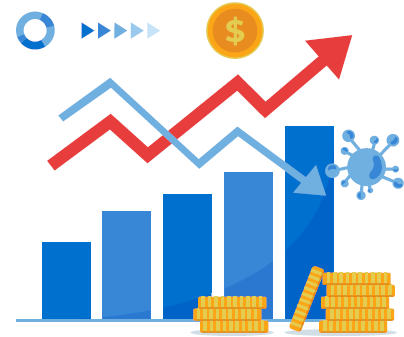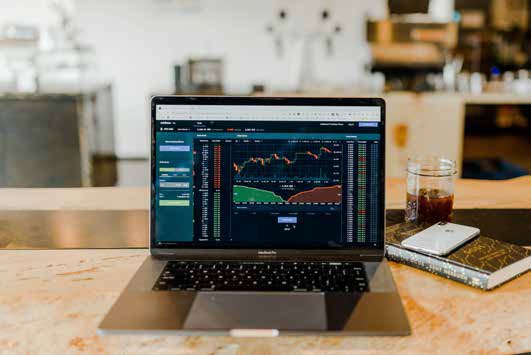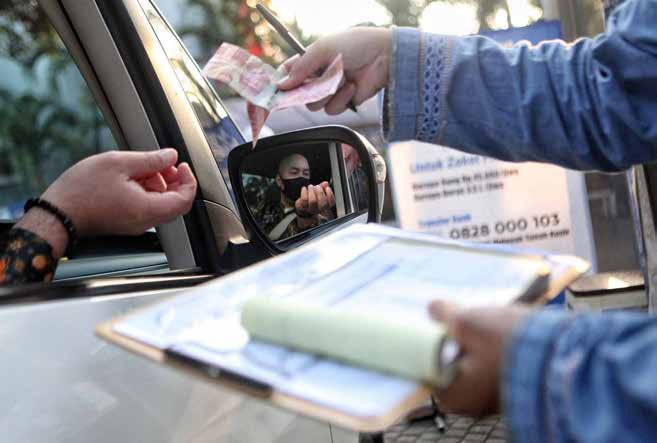OVERVIEW
Who would have thought that a “global lockdown” could ever stomp on the history of human civilisation? Not in a million years, as they say. The casualties of the current pandemic have not only hit hard various economic sectors but they have also incrementally invaded the social fabrics of the global societies. Given the magnitude of uncertainties lying ahead, IMF has projected that the global economy will contract sharply by minus 3% in 2020, much worse than during the 2008–09 financial crisis1; while on the other hand many governments and authorities are doing their best to uplift the morale of their local communities amidst the ongoing lockdown.
“Will the crisis be a V-Shape, U-Shape, or L-Shape?”

A partial recovery, however, is projected for 2021, though it can never be an affirmative answer, at least for now. The economic fallout nonetheless, depends on factors that interact in ways that are hard to predict, including the pathway of the pandemic, the intensity and efficacy of containment efforts, the extent of supply disruptions, and the repercussions of the dramatic tightening in global financial market conditions, shifts in spending patterns, behavioural changes, confidence effects, and volatile commodity prices. Many countries face a multifaceted crisis comprising a health shock, domestic economic disruptions, plummeting external demand, capital flow reversals, and a collapse in commodity prices.
Will the crisis be a V-Shape, U-Shape, or L-Shape? It is not yet clear.
The vital question is perhaps how much of the world economy will endure the lockdown, and this depends on, among others, the accessibility of credit. Business runs on credit. The bits of the economy that do continue to function – the warehouses, the mobile phone providers and internet firms – all need credit. Wage bills for those still working are financed through credit. Even greater is the need of those who are not working. If they cannot get loans, bills will go unpaid, which spreads the pain. To survive the lockdown, millions of families and firms around the world are relying on grants and loans from the state. But tax revenues have collapsed, so states need credit too. Across the world, we are witnessing the largest surge in deficits and government debt.
COVID-19’S IMPACT ON ISLAMIC FINANCE
The growing anticipation of a cyclical economic downturn accelerated by the impact of COVID-19 has worsened credit quality and limited funding, placing greater pressure on the liquidity of financial institutions, particularly banks. Islamic banks are no exception since they all operate within the same financial ecosystem as their conventional counterparts. Prior to the COVID-19 though, the progress of Islamic banks has continued unabated and could now be humbled by the coronavirus pandemic. Although Islamic banks are not exactly in the business of lending and borrowing money, they are essentially deposit-taking entities, which extend financing to deficit units yielding return or margins as a result. In the current climate, the Islamic banking sector could see declining margins, along with slow financing growth and more problem assets, which combined are likely to weaken banks’ profitability. If Islamic banks see liquidity dry up, they will struggle to support financing as a result.
On a bigger scale, Islamic banks, Islamic financial markets and Islamic money markets contribute to providing the financial fuel of the economy. Normally, credit is sustained by the optimistic promise of growth. When that dissolves, the market is subsequently facing a self-reinforcing cycle of collapsing confidence, contracting credit, unemployment and bankruptcy, which spreads a cloud of pessimism.
In the Islamic debt capital market, following strong sukuk activity in the first two months of the year, the coronavirus pandemic has seen international issuance grind to a halt. With an unprecedented combination of low oil prices, economic disruption, health concerns, lockdowns and investor uncertainty, the current circumstances have seen sukuk at a stand-still and although there are some hopes that the market will eventually resume activity, the landscape is likely to look rather different post-pandemic.
On the corporate sukuk issuance, for instance, Dubai Islamic Bank (DIB) was the first to call a delay in its planned USD750 million sukuk4, which could be a wise move to avoid paying a higher profit rate due to the ongoing volatility.
Lower-rated issuers and those most directly exposed to the travel, tourism and consumer spending industries will suffer most. Issuers based in Oman or Bahrain, plus some of those in Dubai, may face obstacles in refinancing their maturing debt or deficits. In Saudi Arabia, despite the fiscal stimulus package of about USD32 billion,5 Saudi companies are also expected to take a hefty economic hit, particularly following the ban on pilgrimages to Mecca and Madinah announced on the March 4, 2020.
IS ISLAMIC FINANCE REALLY ISLAMIC?
The answer to the question above may not be a straight one. But it is nearly impossible to take no notice of the public perception suggesting that the Islamic finance industry has failed to deliver its promises on fairness, equity and inclusion. Furthermore, as the industry has become a real force in the financial markets6, it creates new financial products increasing transaction costs and leading to financialisation.
This could have been due to the process of Islamic financial engineering that has been characterised by a) a greater reliance of plugging ‘classical Islamic financial contracts’ into an Anglo-Saxon-based banking model and, b) a conventional securitisation technique in sukuk issuance has proven to have made Islamic finance appear to be no different than its conventional counterpart.
In my view, an Islamic financial engineering period has been considerably exacerbated by the introduction of; first, wa’ad technique (especially double wa’ad) applied to Islamic financial contracts. The white paper by Deutsche Bank in 2007 was perhaps the first documented articulation on the use of double wa’ad in contemporary Islamic financial engineering.8 Second, the deployment of commodity murabaha through the use of tawarruq for both liquidity management and personal financing purposes. Third, the operationalisation of the concept of beneficial ownership9 and the extension of the khulta (mixture) principle to the field of commercial transactions10; which Islamic capital market through sukuk issuance has undoubtedly been the great beneficiary of the implementation of such concepts. These three components have altered the profile or body of the Islamic financial contracts resulting in the financialisation of the entire Islamic financial services industry.

In the process, one of the unpreventable outcomes is a ‘shift’ in the natural domain of contract, from initially being classified as a benevolent contract to now being a commercial contract. One example is the kafalah contract; upon which a fee is now permissible. This is possible since, in contemporary practice, kafalah has essentially been moulded into ‘shirkatul wujuh’ using the principle of tab’iyyah or subordination.
THE CHANGING FACE OF ISLAMIC FINANCE
Nowadays, innovations are characterised by the use of artificial intelligence (AI), fintech, and internet of things (IoT), or collectively known as the Fourth Industrial Revolution; Islamic finance is encountered with situations where such innovations are creating substantial displacements in industry and employment in major economies around the globe.
It is imperative; therefore, that Islamic finance has no other choice but to change. Furthermore, there is also a genuine demand and opportunity breakthrough championed by the Ministry of Finance Indonesia in partnership with Badan Wakaf Indonesia (BWI) and Bank Indonesia.
It is becoming apparent that the drivers of the change now are no longer driven by an entirely profit geared motive; rather it emphasises upon creating social and environmental impact. In to redirect innovations towards services and products that create more economic opportunities, jobs and financial inclusion for those who have been on the sidelines of the Islamic finance revolution. Coincidentally, we are witnessing the propagation of Environmental, Social and Governance (ESG) discourse, which refers to the three central factors in measuring the sustainability and ethical impact of an investment in a company or business; combined with the proliferation of the immense potential of Islamic Social Finance.
A change of the look and direction in the industry is needed. Malaysia’s recent movement of Value-Based Intermediation in Islamic finance can be considered as evidence of such a change. Another one is the issuance of Khazanah Sustainable and Responsible Investment (SRI) sukuk. Waqf linked sukuk is another other words, it is an admission that the deviations caused by the operation of Islamic finance in relation to the expected or aspired paradigmatic knowledge, theory and institutional emergence have to be corrected14. One way to do that is through the introduction of ESG, Impact Investing and Islamic Social Finance.

WILL COVID-19 REMODEL ISLAMIC FINANCE?
It is perhaps rather premature to provide an affirmative answer right now. However, five dimensions can play a role in reshaping Islamic finance post-COVID-19:

- Social norms and values may evolve.
This can bring about an entirely different perception about life in general, in which social, economic and financial interactions are part of it. The current pandemic has taught us the novelty of compassion, shared solidarity and shared prosperity irrespective of nations, ethnic backgrounds and religions. A heavy reliance on the traditional model of finance and financial system that has resulted in what El-Erian calls inequality trifecta — inequality income, wealth, and opportunity; needs a reality check. This could ignite the global community to question the relevance of the existing institutional setup of financial intermediaries. If so, this can also consequently challenge the existence of institutions supporting the financial industry, such as Basel, IOSCO, IFSB, and IIFM, amongst others.
- Methods of doing business may change.
As the social interaction may shift to a new equilibrium, coupled with the pervasiveness of digitalisation, the way of doing business, work methods and financial dealings may drastically change as well. Automation of processes will be unsurprisingly just a matter of a split second. For Islamic financial transactions, this will surely pose a new territory of challenge. Countless traditional fiqh rulings can be challenged as a result.
- New Assets Classification may likely emerge.
What constitutes an asset may be revisited. To fit the definition of ‘mutaqawwam’ or lawful under Shari’a may alter. A different characterisation of an asset being fungible (mithliyyat) and non-fungibles (qimiyyat), or a different method in distinguishing ‘ayn16 from dayn17 is a sheer possibility. If this materialises, the set of Shari’a parameters as guiding principles for Shari’a-compliant products will shift to a new equilibrium. Consequently, the building blocks of contracts and the landscape of Islamic financial transactions are expected to be different than what we have now.

4) The birth of a new global currency is not to be ruled out.
The recent hype of cryptocurrency and the use of blockchain technology over the past few years coupled with the increasing prominence of digital economy should not go unnoticed. In the literature of classic jurisprudence, what modern society calls now as money was at the time termed as nuqud or ‘umlah. While nuqud refers to money being widely accepted by a large society, the specific meaning of ‘umlah is a type of currency that is only valid in a certain jurisdiction and may not be widely accepted18. Going forward, the survival of fiat money remains to be seen.
- Moving from globalisation to regionalisation.
The pandemic has unravelled the world’s precarious dependence on China as it controls one-third share of the global supply chains19. This can trigger a massive restructuring as production and sourcing move closer to end-users and companies localise or regionalise their supply chains. And in the context of Islamic finance and the halal industry, this can pave the way for an effective realisation of South-South cooperation among OIC member countries.
CONCLUSION
The current situation provides a golden opportunity for all of us to have a moment of reflection. How we respond during this time can determine how we come out of the crisis later on. Compassion, solidarity and selflessness have stood out to become the novel values that unite all humanity across the globe. Finance and economy, logically, should be supported by institutions that are anchored on those values. And Islamic finance has the natural ingredients to be at the vanguard to put those values in place.



